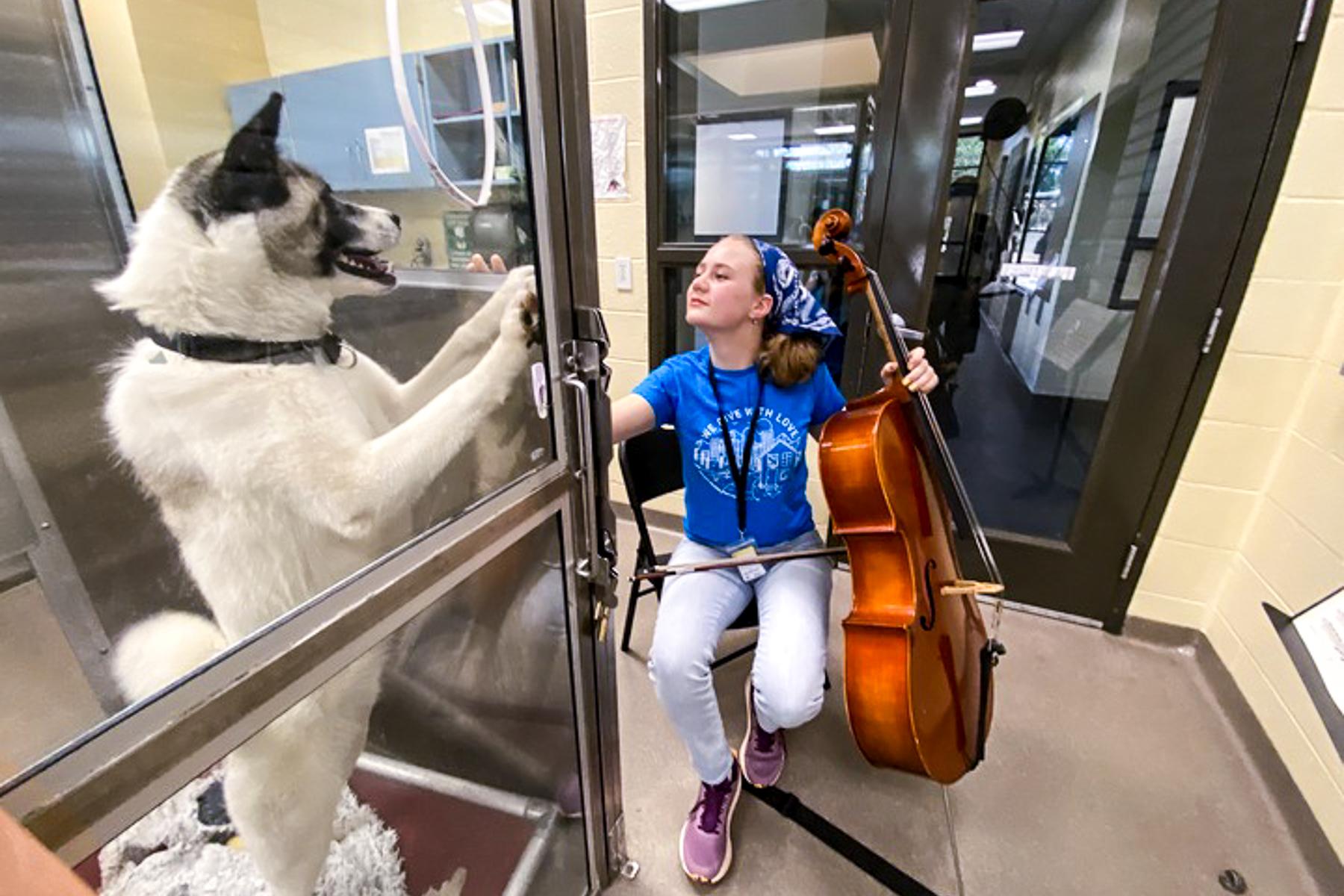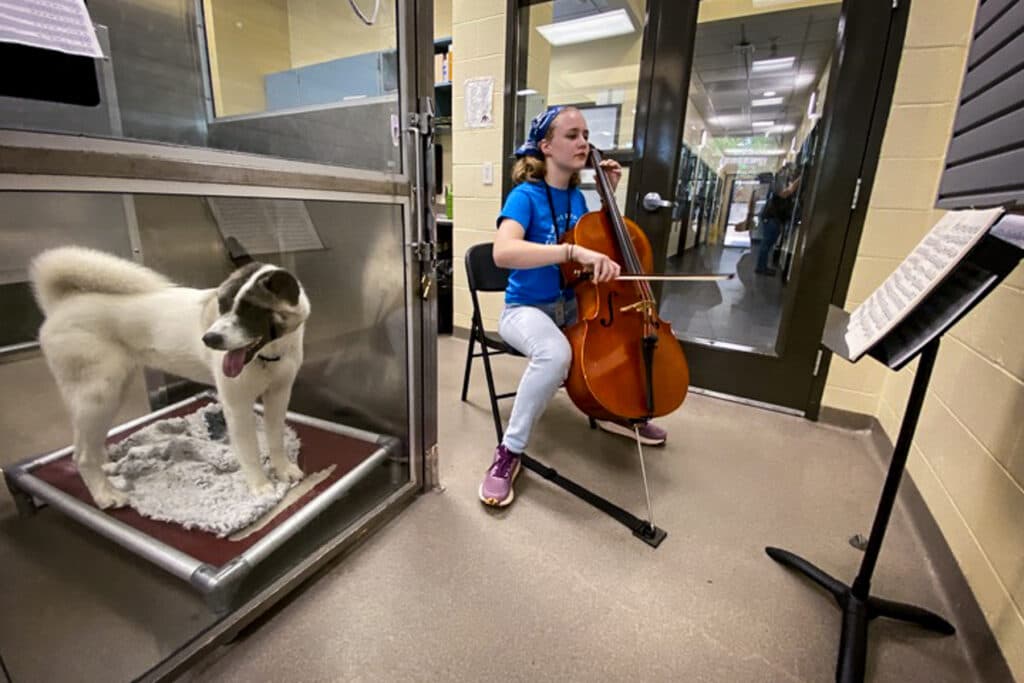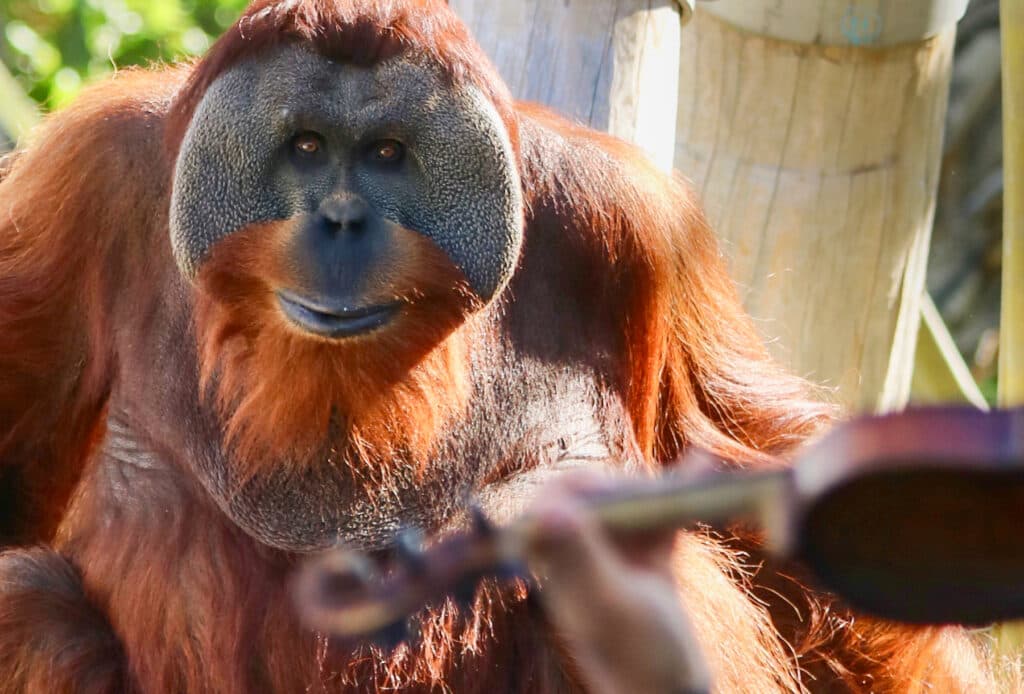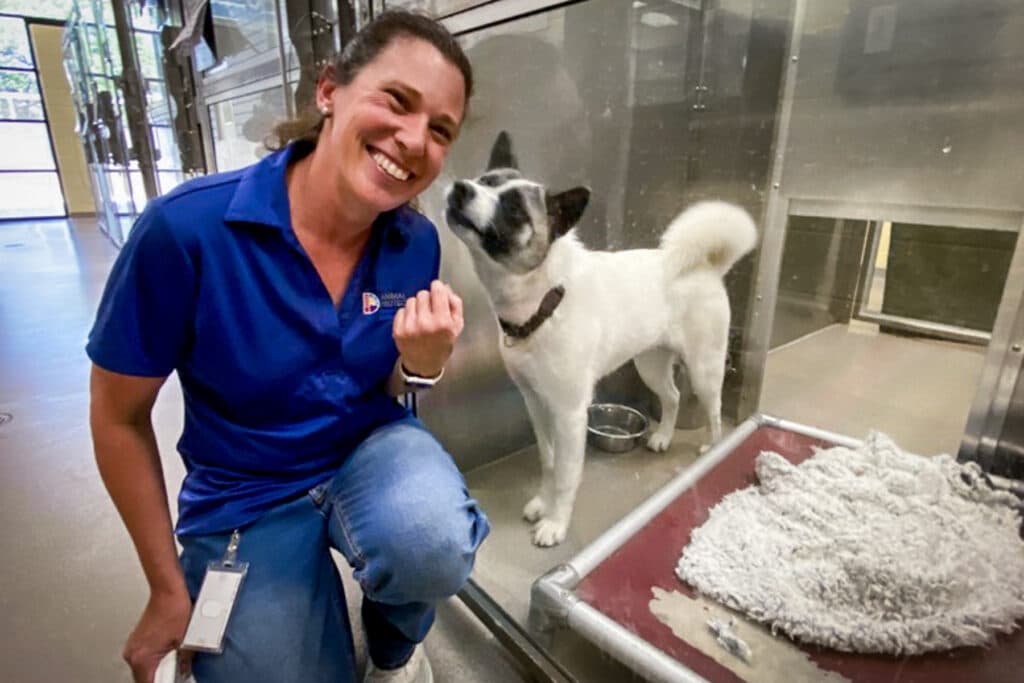
At Denver's main animal shelter, roughly 300 animals hang out, hoping to get adopted.
Entering one room, you’ll find Leilani, a boxer, Milk Dud, a pit bull and at the end of a row of enclosures, a dark-faced white Akita/husky mix. She’s named Coachella, like the music festival, and she’s in for a treat.
Paloma Masching, a student from Lakewood wearing a blue scarf, sits in a metal chair and starts to draw a bow across her instrument.
“Well, I've been playing cello for about nine years now,” Masching said, who worked her way through a variety of pieces by Bach, Brahms and other composers. “I am going to be a junior in high school, and this is my second time volunteering here. And so far it's been really fun.”
She’s here through a program called Wild Tunes. The Houston-based nonprofit, founded in 2023 by a 10-year-old animal lover, organizes volunteers to play music to animals in shelters.
Lucky dogs (and cats)
Since the program started in May, dozens of musicians have been stopping by Denver’s shelter to play and bond with the animals.
“Very popular so far,” said Lauren Rolfe, the Denver Animal Shelter’s volunteer program coordinator. “The volunteers that I've talked to that have joined really, really love the impact that they're able to see when they're playing for the animals.”
The creatures have been treated to a virtual symphony of sound, from musicians playing harp, violin, guitar, piano, steel drums, crystal sound bowls, cello and the flute. Some volunteers have even sung to the animals.
Masching said she’s an animal lover, with a pair of dogs at home, Tallulah, a pit bull and a mut named Finnegan.

Playing before a captive canine audience at the shelter gives her an added level of enjoyment.
“When I'm just playing for myself in my room, there's not really that element of like, trying to be as good as possible,” she said. “But here I definitely feel that.”
Paloma’s mom, Amy Masching, joined her for her daughter’s recent shelter performance.
Amy noticed what this reporter saw — a number of dogs in their enclosures turning their ears, focused on the sound and paying attention.
“Coachella was definitely kind of up on the wall playing and very interested in the music, trying to see what was happening and listening along,” Amy Masching said. “So, very sweet to see.”
Do animals actually like music?
We humans get a kick out of fellow creatures enjoying something we love. There are ubiquitous videos online, like one of a musician playing a violin for some horses. In reaction, one clearly nods his head in what seems like approval, seemingly saying, “Yeah, I love this tune!”
A few years ago, musicians from the Colorado Symphony put on private performances at the Denver Zoo. One giraffe bounced up and down. Orangutans watched carefully, one appeared to smile, and a rhino definitely seemed dialed in, big ears pivoted toward the players.
“I've seen it. I've seen the responses and it's pretty amazing,” said Cindy Cossaboon, a Denver Animal Shelter employee who also worked with apes at the zoo when the symphony musicians played. She thinks instrumental sounds, classical in particular, calm the nervous system of animals.

“I think animals tend to really respond to music,” Cossaboon said. “We've played the radio and that doesn't seem as effective as live music.”
Do dogs or other animals actually like music? Is it soothing for them? Everyone wants a simple response.
“I think it's quite nuanced,” said Lori Kogan, a psychologist and professor of clinical sciences at Colorado State University.
“I think to say that all animals like all music is simplistic and probably inaccurate,” said Kogan, the chair of the human-animal interaction section of the American Psychological Association.
Genre matters
Kogan has studied human-animal interaction for a couple of decades. She said several studies have shown animals seem to like different kinds of music.
Researchers have even explored whether music helps cows produce more milk. The answer? It may, by reducing stress. “A smooth movement of animals through the music barn could be useful to regulate the stress levels in animals and promote easy milk let-down” (or flow), one study found. As always, further research is expected to yield more information.
The use of music with domestic animals “shows great potential as an effective and easy-to-implement therapeutic measure” with many benefits to animal health and welfare,” Kogan concluded in one of her studies about musical dogs.
The type of music appears to matter, Kogan said, noting she did a study years ago that compared genres like heavy metal with classical, which won more paws (like thumbs) up.
“It wouldn't be my first go-to, to go to heavy metal for trying to provide a good atmosphere to shelter dogs,” she said with a laugh. “So I would lean towards classical music,” especially peaceful tunes.
Shelters can be an extremely stressful setting for animals, she said, so the music, plus the human interaction, can be a really positive thing. “It increases socialization,” she said. “If we get less stressed animals, then they're more adoptable.”

Back at the Denver Animal Shelter, with Paloma Masching playing, Coachella definitely does not seem stressed. Curious and attentive would be better words to describe her reaction.
She stood on her hind legs, watching, through much of a 20-minute performance. And Paloma said she’d made a new friend.
“I mean, I get to play my cello and hang out with dogs, which is like my happy place,” she said with a laugh. “So it's basically the best I could ask for.
And it worked out for Coachella, too. Just after Paloma wrapped up playing, the furry husky discovered she’d been adopted.
More information about volunteering with Denver Animal Shelter can be found on its website.








